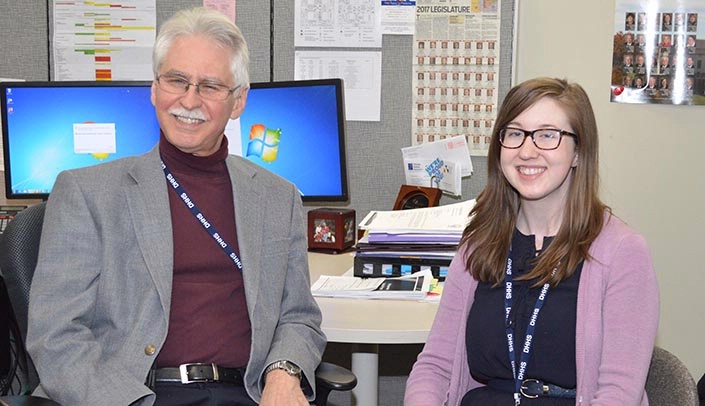Students normally can’t wait to get out of school, but Nora Kovar decided she wanted more.
After three years of working on her medical degree, Kovar took a year off to earn a master’s degree in public health, with a concentration in Community Oriented Primary Care (COPC).
And, to her delight, she hit the jackpot. For the first time, students in COPC were able to shadow leaders in primary care for 16 hours in one semester. Kovar was assigned to the Division of Public Health, Department of Health and Human Services, where she shadowed Nebraska’s Chief Medical Officer and Director Tom Williams, M.D., and other public health professionals in the division.
She learned about the scientific, service and regulatory aspects of public health, as well as legislative considerations. The experience gave her a new perspective of the state and its health needs.
“It’s easy to think of Nebraska as homogeneous, but it’s not. There are large cities and lots of small communities and rural areas. We have a growing Hispanic population and our state has the largest per capita percentage of refugees,” she said.
“I liked that Dr. Williams was willing to say, ‘I don’t know,'” Kovar said. “It taught me that no matter how far you get, you still may not know the answer.”
The experience was a first in this position as well for Dr. Williams, a 1973 graduate. He said he found the encounter invigorating, even inspiring to work with a bright young student. “It reaffirmed to me that we have a great team here. People enthusiastically planned for and engaged to provide Nora a great shadowing experience.”
The most important piece of advice Dr. Williams hoped to impart was that “It’s all about people. We strive to nurture a culture of passionate care; that we serve others.”
Kovar believed for 20 years that she would be a pediatrician, but in the middle of third year clinical rotations she decided to get her M.P.H. because she felt a calling for geriatric care.
“With the geriatric population growing, I want to be an advocate for them,” she said. “I want to work with the patients and their families. There is a need for leaders in geriatrics medicine.”
The shadowing experience helped broaden her horizon. “It helped me better understand how health policy develops and how different factors affect the health of communities. Factors like safety and access to exercise, healthy food and social interaction.

Another remarkable thing about Nora is that she has not slowed her clinical maturation during the MPH year. She has worked regularly to grow her clinical skills in our outpatient clinics. As she begins the fourth year curriculum this summer she is functioning at the level of an intern in her ability to evaluate, synthesize and prioritize problems in her complex older patients. Kudos to a UNMC superstar!